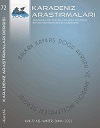Hikâye Anlatıcısının Silinişi ve Okurun Belirişi: Hüzünlü Haz Olarak Okuma Sorunu
Between Disappearance of the Storyteller and Emergence of the Reader: The Problem of Reading as Gloomy Pleasure
Author(s): Atiye Gülfer GündoğduSubject(s): Syntax, Sociolinguistics, Theory of Literature, Phraseology
Published by: Karadeniz Araştırmaları Merkezi
Keywords: Storyteller; Reading; Experience; Pleasure; Walter Benjamin;
Summary/Abstract: In this article “The Storyteller: Reflections on the Works of Nikolai Leskov,” Walter Benjamin discusses the crisis of the reader faced with the written text due to the disappearance of the oral storyteller. Basically, the reader and the text are alone together as the storyteller's body and voice vanish into written world. In our opinion, this position reveals the double-dimensional world of meaning that emerges in the contrast of pleasure and sadness of the reading experience. With the disappearance of that voice and body, the reader – who is left alone with the text- becomes active and free in producing their own meaning for the literary text so frequently associated with pleasure dimension of reading. This article analyzes two essays by Hasan Ali Toptaş – “What Happened to the Storyteller?” and “Being a Reader of the Reader” in Letters and Notes (Org: Harfler ve Notalar) – in the context of the problem of gloomy pleasure of reading. While it highlights the role of the reader, also it also makes room for a reading thought that does not ignore the concept of experience in overcoming this problem – referring to the author's outstanding novel, A Thousand Gloomy Pleasures (Org: Bin Hüzünlü Haz). It also discusses how the exchange of experience can be enlivened in the practice of reading in the relationship that Peter Brooks established between psychoanalysis and storytelling, or hermeneutical thought, which emphasizes the dialogue environment between the reader and the text.
Journal: Karadeniz Araştırmaları
- Issue Year: 2021
- Issue No: 72
- Page Range: 1069-1078
- Page Count: 10
- Language: Turkish

